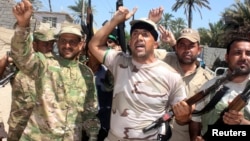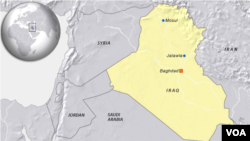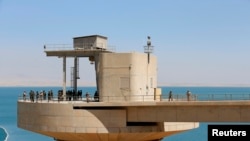Dozens of people were killed in an attack on a Sunni mosque in Iraq's Diyala Province during Friday prayers. Sunni religious authorities are blaming Shi'ite militiamen for the attack, while government military commanders are blaming Islamic State militants. The attack threatens to undercut Iraqi government attempts to forge a unified front against the extremist group.
It was a brutal attack, which began when a suicide bomber blew himself up during Friday prayers, followed by gunmen storming the mosque to kill survivors. The attack took place in the government controlled village of Bani Wais in Diyala Province, north of Baghdad.
Eyewitnesses and Sunni religious officials are accusing members of a hardline Shi'ite militia of the crime. Government military commanders, however, are pinning the blame on Islamic State militants. The hospital in the nearby town of Baquba reported that it received 68 bodies from the attack in its morgue.
Doctors at the hospital told Arab media they fear an attack on their facility by militiamen attempting to kill survivors being treated on the premises. Asharqiya TV reported an Iranian-trained Shi'ite militia was responsible.
Diyala Province Governor Amr Mujamai refused to specify who was behind the crime, but complained that government forces are not in control of large parts of the province:
"The central government is silent about what took place. It was a cold-blooded crime and security forces are not in control. They should react and respond to criminal behavior," said Mujamai.
A top Iraqi Sunni cleric, Sheikh Mahmoud Abdel Aziz al Ani, called on Sunnis to “unite to combat the injustices they are facing.” He went on to denounce the mosque attack.
"Blood was spilled in a house of worship. Shi'ite militants were the perpetrators of the crime. Anyone who would do such a thing is an infidel," said al Ani.
Nahida al Zaini, who represents Diyala Province in the Iraqi parliament accused Iraqi officials of doing little to prevent such crimes:
"The Iraqi central government is doing nothing to punish criminals who commit such crimes and several other recent [militia] killings have gone unpunished," said al Zani.
Several prominent Sunni politicians called for a stop in negotiations to form a new government . Sunni Parliament Speaker Selim al Jabouri indicated he would set up a committee to investigate Friday's killings.
Shi'ite cleric Sheikh Abdel Mehdi al Karbalai, who represents Iraq's revered Grand Ayatollah Ali Sistani, told worshipers in Najaf that a “new government must be formed on a solid base, correcting cumulative errors of the past and restoring rights [to those who have had them taken away].”
Iraqi Sunnis have felt increasingly disenfranchised under the country's Shi'ite majority leadership.



